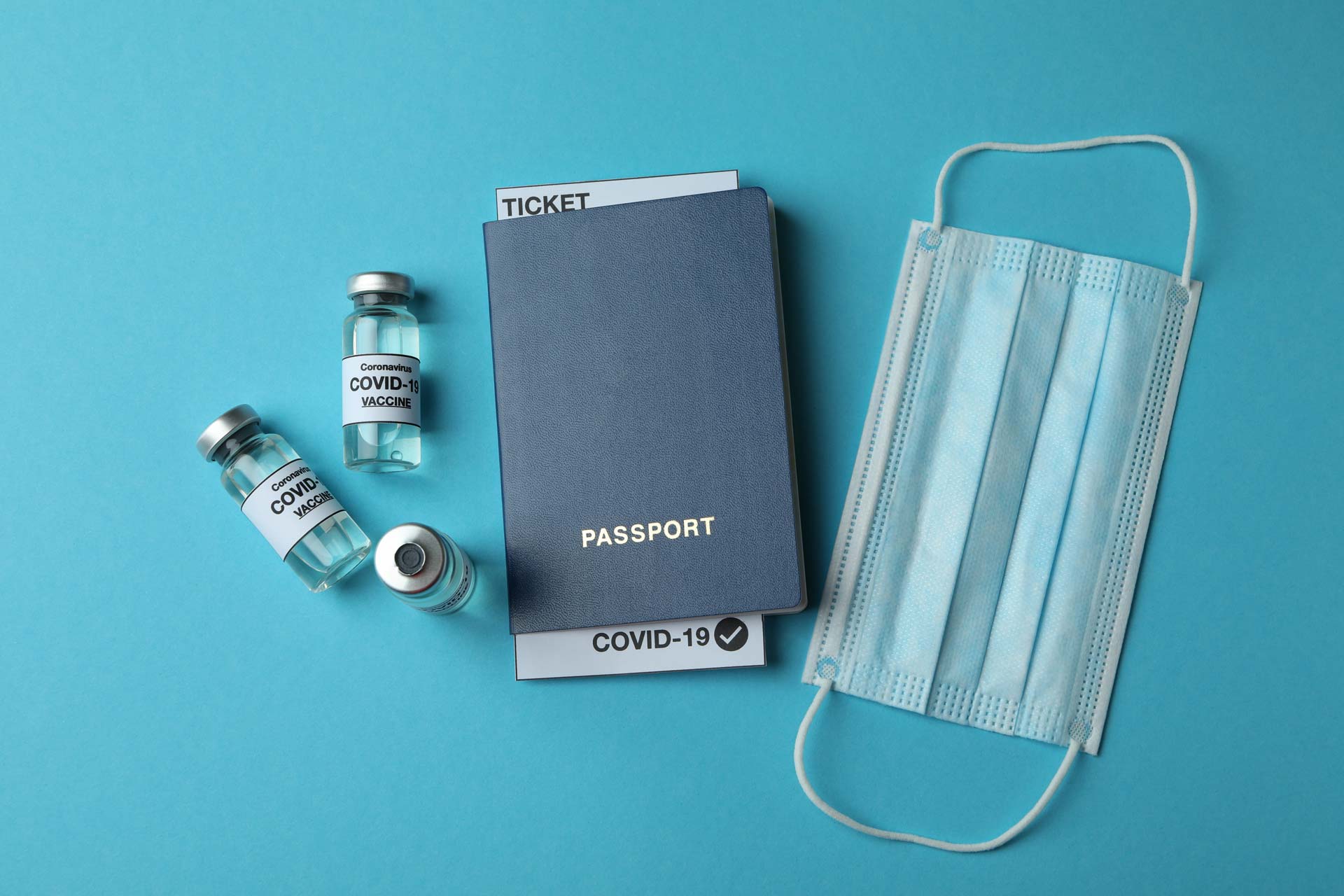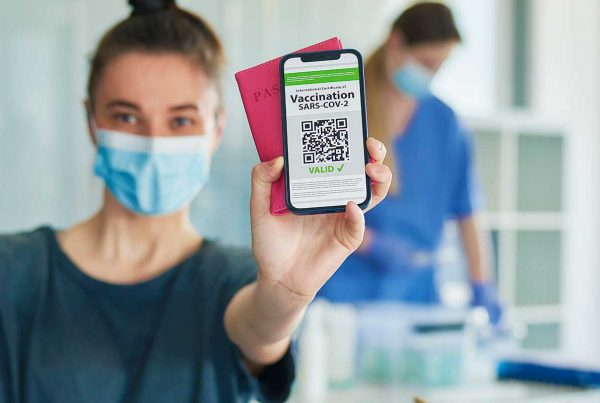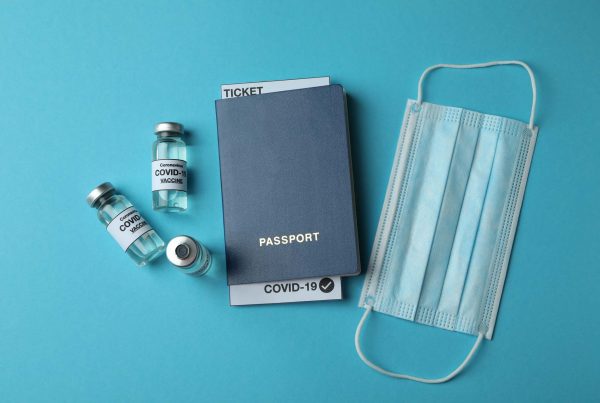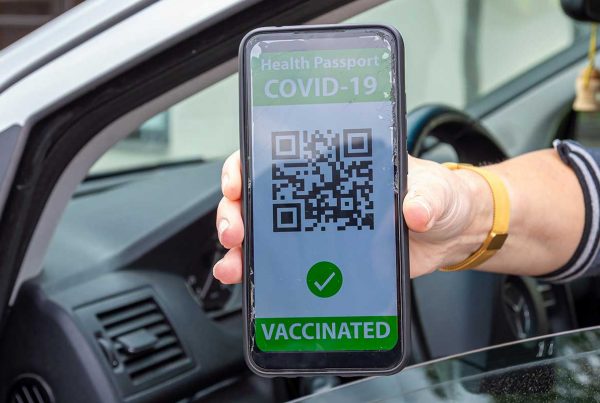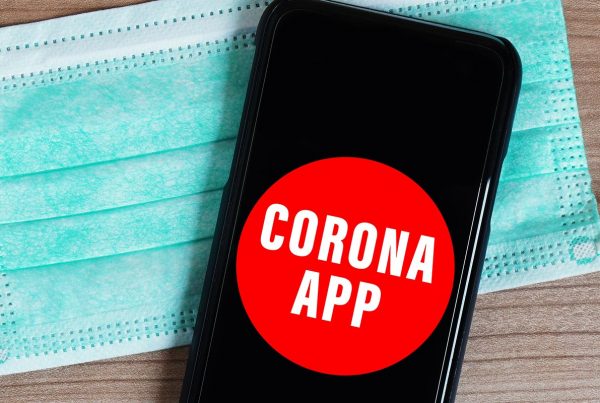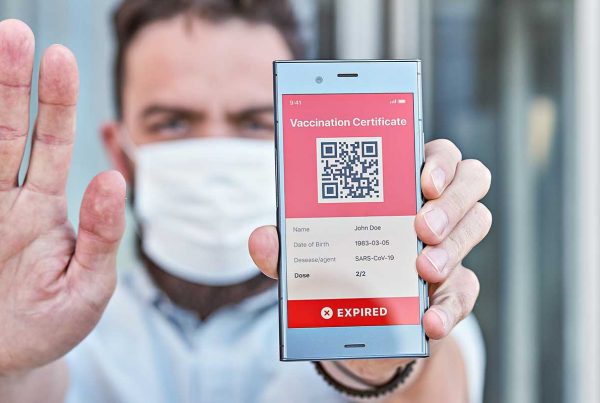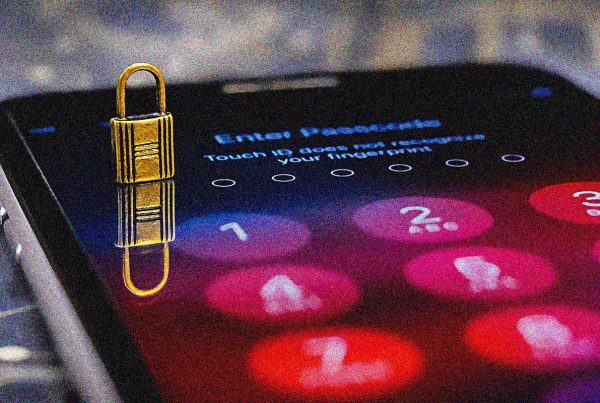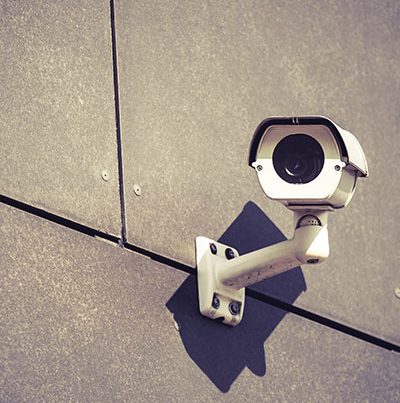Original date of posting: April 13, 2021
Updated August 17, 2021
The lines are being drawn between those who support and oppose some version of a vaccine passport. At the Canadian Civil Liberties Association, we have flashed yellow lights at any effort by a Canadian government to mandate public disclosure of private health care information. But that does not mean that we simply oppose the measure without debate. Instead, we have a job to educate the public about their rights and freedoms and the necessary balance between freedom and public good, in addition to advocating against unconstitutional laws. When reasonable people can disagree about the clear “public good” at hand, heated debate is inevitable. When it takes place after a year of sacrifice, isolation, economic distress for some, and relative privilege for others, it has the potential to get ugly. But any good debate requires a factual underpinning, and it has only become more evident as the conversations about proof of vaccination (colloquially known as vaccination passports) continue that the facts are in short supply. So in that spirit, CCLA offers the following FAQ.
Bring on the vaccine passport, says one camp
Those who favour mandatory vaccine passports say that everything that can be done to potentially reduce COVID19 infection, should be done. If we wear masks to keep others safe, why wouldn’t we similarly be willing to demonstrate our vaccination status? It’s been a year of extraordinary legal orders to control and monitor human behaviour, ranging from contact tracing apps, heat-mapping gathering spots, snitch lines for “covidiot” reporting and a wide range of recommendations and legal restrictions on activities. Some of these have arguably been necessary and proportionate, others not so much, and disagreement remains as to which is which. Vaccine passport proponents ground their support in the fact that fully vaccinated people are less likely to end up hospitalised even if they get infected, making large gatherings less of a public health risk.
Vaccine passports may do more harm than good, says another
Those against vaccine passports point out that proof of vaccination does not equal immunity, and they warn of discrimination and privacy invasion. The proposed passports have an explicit goal of making private decisions about our health public. Just as some communities and groups of people—Black, Indigenous, newcomers, poor, elderly—have been disproportionately impacted by the virus, so may they be particularly impacted by this very public and dispersed version of surveillance as systemic racism may influence choices of service providers and others about who to demand “proof” from, and who to deny access, particularly in the absence of a strict legal regime governing their use. For those with medical or religious grounds for being unable to get vaccinated, risks of discrimination based on who or what they are raise obvious and significant rights concerns. For those on the “no” side of the debate, vaccine passports carry risks for accessibility and equality.
What’s CCLA’s position?
Governments choosing to implement proof of vaccination certificates currently Manitoba and Quebec) must consider and put in place legal and regulatory accountability mechanisms in order to assure meaningful accommodations for those medically unable to be vaccinated or other grounds covered by the relevant Human Rights code. Implementation must be privacy protective, secure, single purpose (public health only) and occur only after every resident has had equitable, meaningful access to vaccination opportunities in the neighbourhood they live or work in, and access vaccine education or information, should they wish it, in the language they understand. Systems should not be digital only, which would increase inequality. Any digital tool should be decentralised and open source, and not facilitate individual tracking. The use of such tools should be time-limited and their impacts should be subject to iterative, publicly accessible human rights review assessments.
What is a vaccine passport?
A vaccination certification provides proof that you’ve been immunized against a contagious infection. It’s something you carry, in either paper or digital form, and that you may be required to show to authorized parties on request in order to access a service or enter a venue.
Although the terms are sometimes used interchangeably, a vaccine passport is similar but slightly different than an “immunity passport” which would include information about past COVID-19 infections, on the theory that those who were infected and have recovered have some immunity from re-infection.
What is the precedent?
There are a few “almost similar” precedents that apply in particular contexts. The most commonly cited is the yellow paper card created by the World Health Organization that travelers must carry and show when entering some countries to demonstrate they have been vaccinated against yellow fever. Currently yellow fever is the only disease specifically addressed in the International Health Regulations (see Annex 7). Canada is a signatory, along with 195 other countries.
There are some Canadian provinces (Ontario, New Brunswick and BC) in which schools require proof of vaccination for children for contagious or dangerous diseases including measles, mumps, rubella (the MMR vaccine) and diphtheria, tetanus, and whooping cough (the DTaP vaccine). In all cases, there are options for parents to opt out of providing such proof based on religious grounds or conscientious objections.
Neither of these is quite the same as a vaccination passport as currently proposed, to the extent that such a passport would ostensibly be required across a wide range of contexts, where risks and benefits varied, and subject to interpretation not by regulated institutional actors (a border agency, a school board) but by a wide range of private and public sector actors (everyone from a shopkeeper to a concert ticket-taker to a cab driver or transit operator, potentially). In other words, the intervention would not be targeted, specific, and auditable, but pervasive, variable, and diffuse.
Why require a vaccine passport?
First, it is important to note that there is a difference between a national proof of vaccination to facilitate international travel, and a domestic passport to gain access to either recreational or essential services in our daily lives.
On the international front, proof of vaccination is likely to be a requirement based on global consensus, and the federal government is engaging in the international efforts to ensure Canadians can be issued a certification that will conform to whatever international standard emerges. They announced their plan to create such a certification in August 2021 although it is unclear when it will be available.
The argument for a domestic document is that it will facilitate a faster, safer return to a pre-COVID lifestyle by providing a means to identify people as “safe” to participate in public life by virtue of either a past infection or vaccination that has given them antibodies against COVID-19. Suggested uses range from resuming interprovincialtravel without requiring quarantines or testing regimes pre/post arrival, to re-opening large-scale gatherings like sporting events or concerts, to participation in everyday life, including visiting a restaurant, movie theatre, gym, or store. The implicit presumption is that people will be hesitant to fully resume a pre-pandemic level of activity without some reassurance of safety, and such hesitancy will hamper economic recovery unless there is a tool to mitigate the perceived risk. The corresponding assumption is that knowing others around us have been vaccinated will contribute meaningfully to our own feelings of safety.
What are the downsides of a vaccine passport?
There are a variety of reasons why the concept of a vaccination passport raises risks to rights and freedoms that require careful consideration including:
Privacy: allowing private entities to collect and use personal health information about us is invasive. Tying the ability to participate in public life with a ubiquitous or persistent form of surveillance (“show us proof you have made a socially acceptable choice about your health”) is a diminishment of the level of freedom we expect in a democracy that must be carefully examined for proportionality in the pandemic context. If the passport is digital or has a digital version, additional issues of technical privacy, security, and access arise.
Mobility: Canadians have experienced unprecedented restrictions on moving around within Canada, from province to province, during the pandemic. A provincial/territorial patchwork of vaccination proof tokens or apps would make the problem worse.
Equality: the choice to be vaccinated is not open to all. There are some people with pre-existing medical conditions or disabilities where vaccination would be counter-indicated, and it is unclear how many people that affects because the vaccines were generally (or primarily) only tested for emergency authorization on healthy adults. People who live with persistent illness or disability are among those who most need human rights protections to ensure equal treatment. Even if the passport simply indicates “medically exempt”, that categorization may affect how individuals are treated (even if such differential treatment is technically prohibited). There are other equality concerns too. Not all members of our society are at equal risk or have equal means to navigate the pandemic while maintaining their health, safety, and income. Front line workers in service and retail are often women, newcomers, racialized, and/or financially insecure, and a vaccination passport regime that predicates participation in the workplace or other activities on proof of vaccination will disproportionately impact those individuals who have little social or political power to resist. Socially sorting people based on personal decisions about their health, which they are legally entitled to make, runs the risk of creating different levels of freedom for different “categories” of people, a risk that is likely to intersect with other systemic inequalities and affect some groups more than others.
Liberty: policies that facilitate vaccination status as a precondition to full participation in public life run the risk of rendering a voluntary vaccination regime de facto mandatory. While public opinion is swinging towards the position that such actions may be reasonable in a pandemic, such policies must be rationally connected to a demonstrable public benefit, accountable, and rights-compliant.
What are some current initiatives for a digital version of a vaccine passport, and what would be the benefits and risks of making a vaccine passport digital?
There are already a number of initiatives underway to create some version of a vaccination passport, either building on existing tools or starting from scratch. Canada’s Health Minister, Patty Hajdu, met with the health ministers of other G7 countries on March 31, 2021 to discuss the possibility of a coordinated approach to vaccine passports, while stressing that Canada would only consider using such a tool if it is based on “reliable scientific evidence” and noting that the decision to issue such a passport would be led by provinces and territories.
Internationally, the WHO is working on a Smart Vaccination Certificate, pulling together a consortium of experts to focus on software-neutral specifications, standards, and a trust framework. Rather than create an app, they will be vetting apps created by others and creating a list of those that adhere to their standards for security, authentication, privacy and data exchange.
IATA (The International Air Traffic Association) is working on a Travel Pass Initiative, a digital platform they pitch as “a global and standardized solution to validate and authenticate all country regulations regarding COVID-19 passenger requirements.”
The European Union has proposed a “Digital Green Certificate” for use within Europe. Israel also made use of a “Green Pass” for a period of time to allow access to gyms, hotels, and travel to limited locations.
The risks of making a vaccination passport digital are similar to those of any digital tool that collects and shares sensitive personal information with potentially consequential impacts on people. All the privacy and other rights-based concerns identified above continue to apply regardless of whether the passport is paper, plastic or digital, but going digital adds complexity to the concerns due to the potential for data collection, combination, and breach.
Concerns range from ensuring the right technical privacy protections. Questions are multiple: what data is collected and used? Where does it come from? Where does the data live–your device or a central server? How is it transferred to a requestor? Authenticated? Updated? Secured? Is it used to simply display a credential (much like flashing a paper certificate or ID card) or scanned and recorded, and does the scan connect to a personal identifier accessible to the requestor? The right data governance framework will also impact the way the tool works in the world: is the credential tied to a central digital identifier? Is that identifier–such as a health card number–shared or kept private after it’s used to authenticate the user and vaccination status? How is that authenticated? Who certifies the authentication for external requestors? What kinds of data linkages are created and what linkages are made possible that may be undesirable? Will there be risk scores/AI-driven analysis as part of a system? There are more, but that’s enough to make the point. Is it governments, a private sector vendor, or a collaboration that creates the tool, and which of those stakeholders has access to data collected on the app? At the same time, while going digital ups the ante in terms of complication, it may still be desirable for some users because of convenience and flexibility. For example, it would likely have the capacity to be updated quickly and relatively easily, or serve other public health goals, such as reminding people when they’re due for a booster.
What would be the legal basis for requiring the use of a vaccine passport?
The legal basis will vary from jurisdiction to jurisdiction, as some provinces/territories are laying the legal groundwork for these documents while others reject them. A mandate for requiring an individual to display a vaccine passport could be created in a similar way to the masking requirements many provinces or territories have enacted. In Ontario, for example, we have a regulation (546/20) under the Reopening Ontario (A Flexible Response to COVID-19) Act, 2020 that mandates masks indoors. Any legislation would of course have to be constitutional, which is an appropriately high and fundamental bar.
At an international level, for international travel, the Review Committee on the Functioning of the International Health Regulations (2005) During the COVID-19 Response might make recommendations on how to document safe traveler status, which possibly could result in the amendment of the IHR which eventually, if passed, would affect the 196 countries signatory to it.
It is becoming clear, although undesirable, that non-regulated uses of vaccination passport tools are arising in sites such as workplaces, concert venues, sporting arenas, or other settings where there is private incentive to either verify safety or at least, be seen to be trying to do so. In such cases, the legality would require close examination within specific jurisdictions and with attention to a range of relevant statues, including but not limited to privacy laws, health and safety laws, labour laws, and human rights legislation.
CCLA often gets asked specific questions about the legality of certain actions taken by organisations or businesses. For example:
Can my employer force me to get vaccinated if I want to keep my job? What about universities mandating vaccines for my child?
As this is a new legal issue, it is difficult to provide a general answer to your question. If you have questions about your specific employment situation, please consult a lawyer or your provincial human rights commission. A list of pro bono legal resources in Canada by province is available from the Canadian Bar Association, and they also provide a tool to help you find a lawyer in your province or territory.
Can restaurants, gyms and salons only allow entry to those who are fully vaccinated?
As this is a new legal issue, it is difficult to provide a general answer to your question. Businesses are governed by both human rights legislation (which prohibits discrimination based on certain grounds) and privacy legislation, which limits the personal information that they can collect. A list of legal resources by province is available here. For legal advice on a specific refusal of service, please contact your local human rights commission.
What’s happening in Canada?
The situation is changing all the time, but as of August 17, 2021, the plans for Canadian provinces and territories who have made formal announcements are as follows:
Manitoba is issuing proof-of-immunization cards to those who are fully vaccinated. The health orders that specify uses for this card, which include eliminating quarantine requirements after out-of-province travel, can be found on the province’s website, here.
Quebec has plans to allow their QR-code based vaccine certification to be used to limit access to some kinds of businesses and events if they experience a fourth wave.
Alberta, Saskatchewan, and Ontario have announced they will not be creating a provincial vaccine passport regime.
The federal government announced plans for a national proof of vaccination system for international travel on August 11, 2021.
What do Canada’s Privacy Commissioners say?
In a joint statement by the federal, provincial and territorial privacy commissioners, published May 21, 2020. They emphasize that in light of the serious privacy risks involved, any vaccine passport initiative must be necessary and evidence based, likely to be effective, with risks that are proportional to the benefits. There must also be clear legal authority, consent and trust, safeguards and independent oversight, and time and scope limitations.
How many people are currently vaccinated in Canada?
Data from June 2021 suggests that 88% of Canadians wish to be vaccinated, 9% just say no, and 3% are undecided. That is an excellent rate. As of August 17, almost 83% of eligible people 12+ have received a first dose, and 73% have received two doses.
It is important to focus on identifying and eliminating the barriers that are creating the 8% gap between those who say they want the shot and those who have had at least one dose. Do people need rides to a clinic or in-home visits? Do they need some paid hours off to get the jab, or the social support to take a sick day if they have side effects without risking losing their pay or their job? Are they a member of a population who has experienced systemic racism at the hands of the health system, and what kinds of interventions might promote trust in that situation? If these are the types of barriers that exist for the relatively small proportion of the population who are medically able and willing to be vaccinated but haven’t yet been inoculated, it will be important to ensure that a vaccine passport plan does not exacerbate the problems.
What’s next?
Governments around the world are considering or implementing vaccination passports, and the science supporting their use (or not) is evolving. The idea that Canada might require proof of health status to access public or private services domestically is actually a radical one. Radical doesn’t mean bad, or good, but it does mean that serious consideration on ethical, moral, social, health, and legal grounds needs to be given before moving forward. We shouldn’t be having an “of course” moment about this kind of intervention. And it’s easy to miss that fact, because we’ve been dealing with so many restrictions, in a time of so much fear and uncertainty, that we’ve been slowly acculturating to the idea that the end justifies the means when it comes to the pandemic. Sometimes it does. Sometimes it doesn’t. We need to step outside of our own fear, and demand government leaders step outside of theirs, and subject every intervention, vaccine passports included, to a rigorous analysis grounded in science, in necessity, and in proportionality. With this, as with every policy decision and technical intervention we make to facilitate public safety during this pandemic, we still need to think, up front, about what we want our country to look like now, and in the future.
What is CCLA doing?
We are writing to governments, (our first letter was in April of 2020) warning of risks to rights if Canada goes down the vaccine passport path. Our most recent communications were sent to the Manitoba government. See our Live COVID Updates for all of our past and recent communications regarding vaccine passports.
We are speaking out in the press and media. Below are a few examples.
From our Executive Director, Michael Bryant:
- Vaccine passports on CP24 (video)
- The Agenda with Steve Paiken: Do we need vaccine passports? (video)
We are monitoring intentions in each province and considering where and how policy or other kinds of interventions could be impactful.

